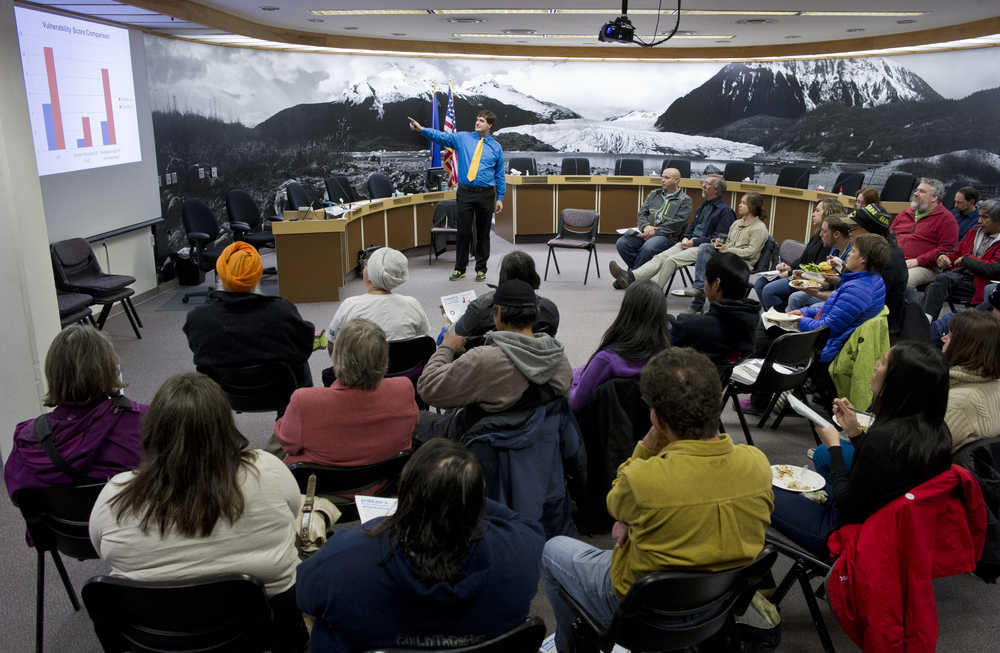Within the already delicate homeless population exists a subgroup of people classified as vulnerable. Their greatest vulnerability — a premature death.
A two-day search by Glory Hole workers and volunteers in late September revealed 40 individuals in Juneau are living without shelter and in conditions that put them at risk for an untimely death. This is the second such Vulnerability Index survey in Juneau. The last one was in 2012, and the number hasn’t changed.
According to the survey results, which were at the center of a community luncheon Monday at the Juneau Assembly Chambers, the average time spent living on the streets for vulnerable individuals is more than nine years. Alaska Natives made up 54 percent of the homeless population surveyed.
Brian Wilson, research analyst for the Alaska Mental Health Board, said the data was staggering considering Alaska Natives only make up 11.9 percent of the area’s population.
Ways in which the homeless population’s needs can effect the local economy were also realized through the survey. Those surveyed said they required emergency care 87 times in the last three months, a full hospital stay 55 times in the past year and were in jail 435 times throughout their lives.
While addressing a crowd that included several current and former homeless individuals, Wilson admitted that Housing First would not be a save-all solution because the facility can only handle 32 people, but he called it “a place to start.”
Mariya Lovishchuk, executive director of the Glory Hole, Juneau’s homeless shelter and soup kitchen, said eight people died since conducting the last survey.
“The population of people who are experiencing homelessness are not different from the general population that is aging,” Lovishchuk said. “Just as there is a concern that Juneau doesn’t have enough supportive housing for people who are older, there is only one facility in the works for the vulnerable (homeless population).”
The project Lovishchuk spoke of, Housing First, is set to break ground early next year if it can raise the missing $2.4 million needed for the $7.3 million project. It would be the first complex of its kind in Juneau to grant formerly homeless tenants a residence without requiring they abstain from alcohol and other legal acts. It specifically appeals to a population that often struggles with addictions that set them up for failure in other housing settings, Lovishchuk said.
“Housing is the most fundamental human need to get healthy and back on track,” Lovishchuk said. “You can’t get back on track when you’re constantly worried about getting raped, hurt or being cold. It’s hard to gain control back of your life.”
Luncheon guests who said they were familiar with the realities of the homeless population spoke out against the accuracy of the figures, stating a much higher vulnerable population exists than what was surveyed.
Lovishchuk said she believes three-quarters of the true vulnerable population were surveyed and the numbers could be trusted.
In fact, Lovishchuk said the Glory Hole’s survey goes beyond what even national surveys often achieve because the Glory Hole extends itself to where homeless people stay instead of waiting for them to show up and be counted.
“A lot of folks we interviewed this time, they don’t come to the events (by national survey counters,)” Lovishchuk said. “They just kind of fall through the cracks.”
Wilson said what it means to be homeless isn’t always understood by the general population that places stereotypes upon the group, further adding to the inability to recognize the needs of homeless people. In reality, Wilson said 32 percent of the vulnerable and homeless have jobs and only 9 percent are using public assistance programs to find stable housing. Another staggering figure: 60 percent reported living outdoors or in vehicles, a fact Wilson said to keep in mind as winter develops.
Architect Paul Voelckers of the Juneau firm Minch Ritter Voelckers, which is designing Housing First, said the community luncheon with input from the homeless population in combination with facts from the report brought to life what at times is just a plan on paper. He also addressed concerns that Housing First would not be enough for the needs in Juneau, explaining the facility is set up for two phases, the first being a 32 apartment model, and the second designed to double the occupancy capacity. The community’s willingness to fund such an expansion will decide if it phase two comes to fruition, Voelckers said.
• Contact reporter Paula Ann Solis at 523-2272 or at paula.solis@juneauempire.com.

